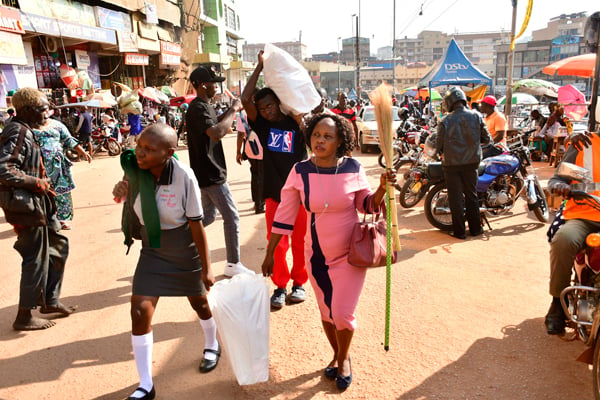Prime
Parliament queries delayed release of capitation grants

Leader of Opposition in Parliament Joel Ssenyonyi addresses the House on Tuesday and Deputy Speaker Thomas Tayebwa chairs the plenary sitting on Tuesday. Photos | David Lubowa
What you need to know:
- The Leader of Opposition in Parliament says some schools have failed to reopen and learners have been left stranded due to the delay.
The Deputy Speaker of Parliament, Mr Thomas Tayebwa, has tasked the Ministry of Education and Sports to table a statement explaining reports of delayed receipt of capitation grants for government-aided schools.
This has led to some schools remaining closed days after the commencement of the academic year.
The directive followed concerns raised by the Leader of Opposition in Parliament, Mr Joel Ssenyonyi, who told the House on Tuesday that the delay had left learners stranded.
“Yesterday schools opened for the term and we have been getting calls regarding capitation grants. This money has not gone to the schools as it should be. Some schools have not yet opened, capitation grants is money meant to empower the operations of schools,” Mr Ssenyonyi said.
He added: “Once this money is not available to the schools, how do we expect them to operate? Why do we delay yet we knew when the term opens? Is it a challenge with the Ministry of Finance, the Ministry of Education or Local Governments?”
Schools officially opened on Monday for the first term of the 2024 academic year.
In response, the State minister for Finance in-charge of General Duties, Mr Henry Musasazi, said the delay was likely caused by the districts.
“In quarter three, we released Shs134b for the capitation grant. This money was released to the various local governments. What we expect the local governments to do is to warrant, but sometimes the districts take time. They continue to receive as and when they are ready,” he said
Mr Ssenyonyi also called for an increase in the amount of money budgeted for every pupil if output in results from the government schools is to improve.
“This capitation grant is too little money. When you have Shs20,000 per pupil per year, and we expect good standards and for these children to perform and compete at the international level. It’s not possible, the magic will not happen. I hope that we can review this,” he said.
Mr Tayebwa also tasked the ministry to explain the persistent poor performance of students living with disabilities.
This followed concerns raised by Ms Laura Kanushu, the representative of persons with disabilities, who accused the government of doing little to help the vulnerable population.
“In the recently released PLE (Primary Leaving Examinations) results, schools of children with disabilities have failed miserably. It goes back to the issue of funding. Most of these schools are government-aided. There are no specialist teachers, there are no materials that speak to the needs of these learners. I think as a government we have decided that students with disabilities should not go to school or if they go to school they all should fail,” she said.
In the results released on January 25, none of the 203 special needs pupils who did the exams passed in Division One
Mr Dennis Mugimba, the spokesperson of the Ministry of Education and Sports, said the government has already released capitation grants for the third quarter (January to March)
He said the money is expected to reach the accounts of respective schools this week.
Mr Mugimba refuted allegations about delays in the release of the capitation grants.
However, most schools that this publication talked to called for the timely release of funds to enable them to plan better.
They also suggested that the government should consider increasing the amount allocated per child per year, saying what they currently receive is inadequate.
Ms Rhoda Nakaye, the head teacher of Munyonyo Primary School, said last term, the school received Shs1.6m, which was not enough.
“The capitation grant is very little. If I have 666 pupils and I am allocated Shs1m, budgeting becomes difficult. You can easily fail to allocate it. I think this should be tripled to make life better in government schools,” Ms Nakaye said.
Mr Charles Dexious Mukisa, the head teacher of Railway Children’s School in Nsambya, said: “The grant delays to come and it is not enough. Sometimes, we have to use parents’ money to implement school activities.”
Mr John Kabanda, the head teacher of Hillside Junior School Kisugu, also acknowledged the need to increase funding to ensure the smooth running of schools.
On the issue of the low turnout of learners on the first day of the term, Mr Kabanda said primary schools were affected the most since parents give priority to children in secondary schools.
He noted that the lack of school requirements was hindering some parents from sending children on time.
Last year, the National Planning Authority recommended to the Education Review Commission that the government should consider increasing capitation grants allocated to schools to enable them to provide quality education.
About the grants
According to capitation grant guidelines, about 50 percent of the grant is supposed to be spent on instructional materials, 30 percent on co-curricular activities, 15 percent on school maintenance and utilities, including water and power and five percent on school administration.
Capitation grants are released every quarter and the amount allocated to each school depends on the school enrolment.




